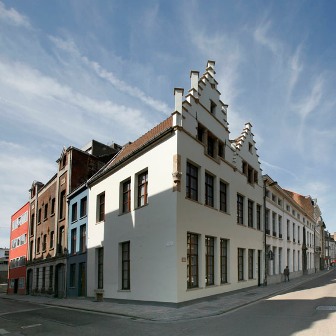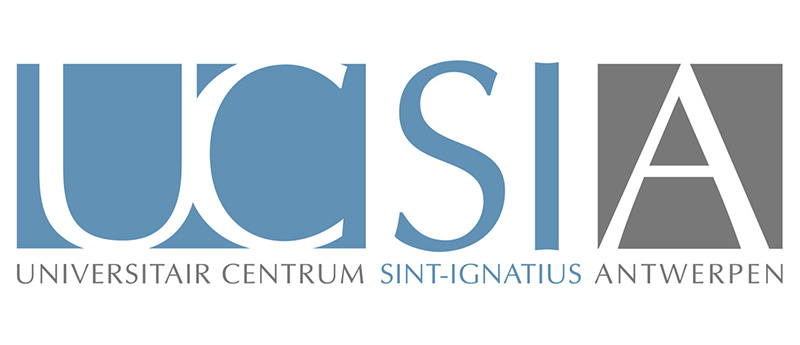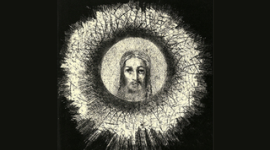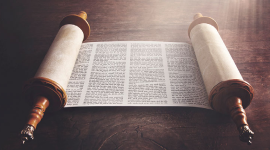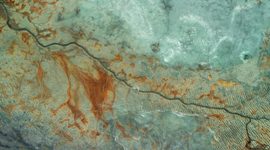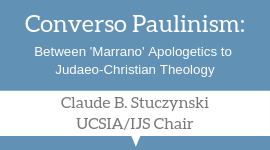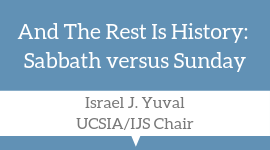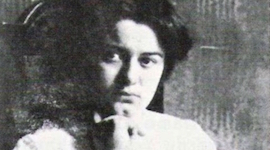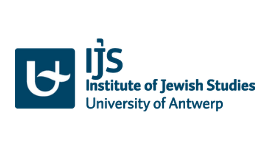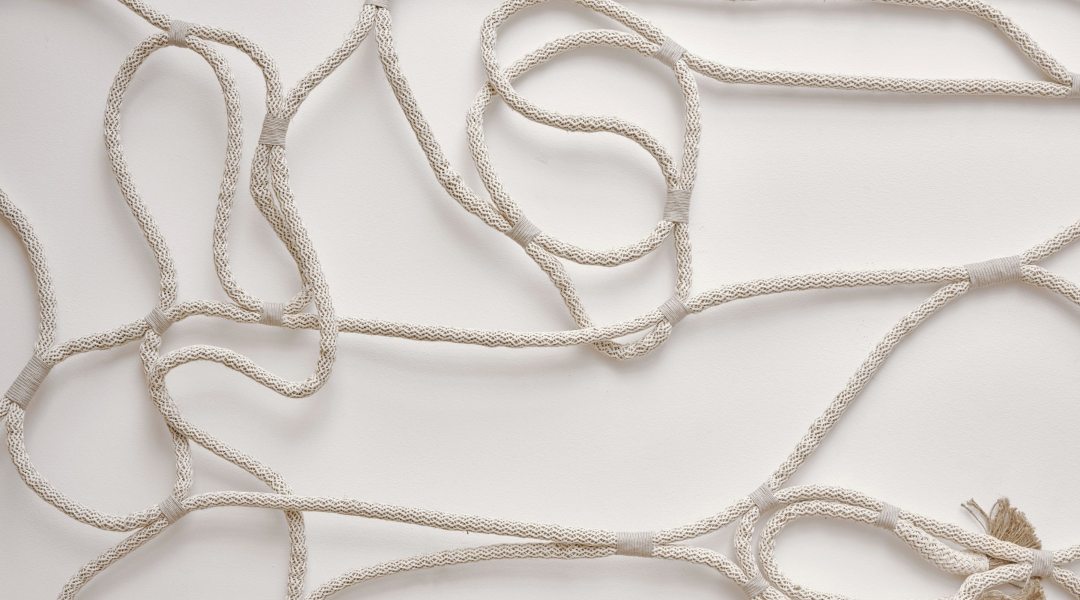
UCSIA/IJS Chair Jewish Christian Relations
UCSIA and the Institute of Jewish Studies express their common attention for Jewish-Christian Relations by establishing a new chair at the University of Antwerp in the academic year 2008-2009.
The chair aims to encourage the study of Judaism’s and Hebraism’s history from the perspective of Jewish-Christian dialogue in order to interpret its place in the contemporary European culture and to investigate its contribution to the interreligious dialogue.
The chair implies academic activities on the subject matter for the benefit of the students and scholars of the University of Antwerp (such as guest lectures, master classes or academic workshops) as well as a lecture for a broader audience. Prof. dr. Vivian Liska coordinates the chair at the Institute of Jewish Studies. The chair is held by an internationally renowned scholar.
David Ruderman (Chair holder 2016-2017) on the UCSIA/IJS Chair
Ariel Mayse (2021-2022)
On the occasion of the 14th edition of the UCSIA/IJS Chair for Jewish Christian Relations, UCSIA and the Institute of Jewish Studies (University of Antwerp) have invited professor Ariel Mayse (Stanford University) to give a keynote lecture on environmental ethics from a Jewish perspective. A response based on common Judeo-Christian and Christian sources was brought forward by professor Annemarie C. Mayer (Trier University).
In his lecture professor Mayse explored how to draw upon the full range of Jewish theological, legal, and philosophical literatures to construct an environmental ethic, one that counters the values of market individualism and extractivism with alternative narratives and theories of obligation toward the non-human world. He suggested that Rabbinic tort law can help us conceive of thorny problems like distributive justice, collective action, cumulative pollution, and “slow violence”; Jewish creation narratives offer a vision of an integrated world, connected by sacred time and space beyond human instrumentalization; its mystical tradition enables the cultivation of resilience and hope through contemplative interiority. “The ecological crisis,” writes Mary Evelyn Tucker (director of the Forum on Religion & Ecology, Yale University), “is also a crisis of culture and of the human spirit. It is a moment of reconceptualizing the role of the human in nature.” The aim of his work is to contribute to such renewal through constructively reading the sources of Jewish law and theology. Watch the webinar here.
Ariel Evan Mayse joined the faculty of Stanford University in 2017 as an assistant professor in the Department of Religious Studies, after previously serving as the Director of Jewish Studies and Visiting Assistant Professor of Modern Jewish Thought at Hebrew College in Newton, Massachusetts, and a research fellow at the Frankel Institute for Advanced Judaic Studies of the University of Michigan. He is currently a fellow at the Kogod Research Center at the Shalom Hartman Institute of North America.
Mayse holds a Ph.D. in Jewish Studies from Harvard University and rabbinic ordination from Beit Midrash Har’el in Israel. Mayse’s research examines the role of language in Hasidism, manuscript theory and the formation of early Hasidic literature, the renaissance of Jewish mysticism in the nineteenth and twentieth century, the relationship between spirituality and law in Jewish legal writings, and the resources of Jewish thought and theology for constructing contemporary environmental ethics.
He is the author of Speaking Infinities: God and Language in the Teachings of Rabbi Dov Ber of Mezritsh (Philadelphia: University of Pennsylvania Press, 2020; Hebrew translation, forthcoming in 2021), and the two-volume A New Hasidism: Roots and A New Hasidism: Branches, with Arthur Green (Philadelphia: Jewish Publication Society and University of Nebraska Press, 2019). His newest book, As a Deep River Rises: Judaism, Ecology and Environmental Ethics is under contract with Brandeis University Press.
Danielle Cohen-Levinas (2020-2021)
On the occasion of the 13th edition of the UCSIA/IJS Chair for Jewish Christian Relations, the French philosopher and musicologist Danielle Cohen-Levinas of Sorbonne Université, gave a keynote lecture, on the topic of separation.
Judaism and Christianity are Abrahamic religions that share a common text: the Hebrew Bible. From the second century onwards, however, this common foundation has undergone, from within Judaism itself, what we call a separation. Cohen-Levinas examined during her lecture what separation means from a historical, theological, and philosophical point of view. By doing so, she drew on texts by various philosophers, in particular Franz Rosenzweig and Emmanuel Levinas, in order to clarify and understand where the issues of separation lie. Read the summary of the lecture here.
Prof. Danielle Cohen-Levinas is a philosopher and musicologist. She attended the Conservatoire National Supérieur de Musique, l’Ecole Normale Supérieur de musique and l’Université Paris I and IV Sorbonne, where she has been a professor since 1998. In 2011 she founded the Collège des études juives et de philosophie contemporaine – Centre Emmanuel Levinas. She is an associate researcher at the Archives Husserl de Paris in l’Ecole Normale Supérieure de la rue d’Ulm. Her research focuses on musical aesthetics, contemporary philosophy, French post-phenomenology and Judeo-German philosophy. Danielle Cohen-Levinas is also chairman of the magazine Cahiers Maurice Blanchot, which she started in 2010 together with Monique Antelme and Mike Holland. Finally, she is collection director at Editions Hermann.
Panel debate - Levinas: Between Judaism, Christianity & Philosophy
The subject of 12th edition of the UCSIA/IJS Chair for Jewish Christian Relations was the French philosopher Emmanuel Levinas and his legacy. Prominent Levinas experts prof. dr. Shmuel Wygoda (Department of Jewish Philosophy at the Herzog College, Alon Shevut/Jerusalem), prof. dr. Marcel Poorthuis (Tilburg University), prof. dr. Arthur Cools (University of Antwerp) and prof. dr. René Dausner ((Institut für Katholische Theologie, Universität Hildesheim) interpreted Levinas’ work respectively from a Jewish, Christian and philosophical perspective.
Claude (Dov) B. Stuczynski (2018-2019 - 2nd semester)
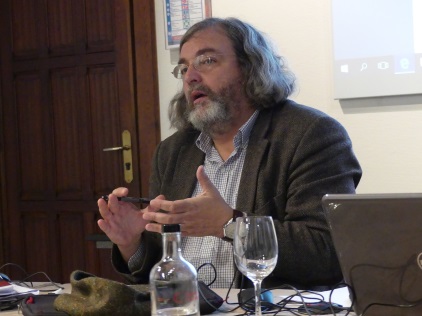
Claude (Dov) B. Stuczynski is an Associate Professor in the Department of General History at Bar-Ilan University and board member of the Center for the Study of Conversions and Interreligious Encounters (CSOC) at Ben-Gurion University. His two central fields of research are the Portuguese Converso phenomenon and the first encounters between Europeans and Amerindians. He is particularly interested in the relationship between religion and politics in Medieval and Early Modern periods and is currently preparing a study of the theological-political dimension of the Converso phenomenon (what he terms “The Marrano Paulinian Moment”).
Leora Batnitzky (2018-2019 - 1st semester)
Leora Batnitzky is Ronald O. Perelman Professor of Jewish Studies and Chair of Department of Religion at Princeton University. Her teaching and research interests include philosophy of religion, modern Jewish thought, hermeneutics, and contemporary legal and political theory. In 2002 she received Princeton’s President’s Award for Distinguished Teaching. She is the author of Idolatry and Representation: The Philosophy of Franz Rosenzweig Reconsidered (Princeton, 2000), Leo Strauss and Emmanuel Levinas: Philosophy and the Politics of Revelation (Cambridge, 2006), and How Judaism Became a Religion: An Introduction to Modern Jewish Thought (Princeton, 2011). Her current book project, tentatively titled “Conversion Before the Law: How Religion and Law Shape Each Other in the Modern World,” focuses on a number of contemporary legal cases concerning religious conversion in the U.S., Great Britain, Israel, and India.
10th Anniversary Conference - Jews and Jesuits: Contacts Across the Ages (2017-2018)
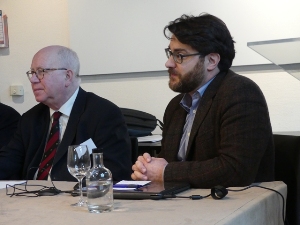
The conference on ‘Jews and Jesuits: Contacts across the Ages’, organised in Antwerp on February 1st-2nd 2018 to commemorate the tenth anniversary of the Chair for Jewish-Christian Relations of the Institute for Jewish Studies of the University of Antwerp and the University Centre Saint-Ignatius Antwerp, brought together nine experts from Europe and the US, to present case studies from the history of intellectual encounter and exchange between Jewish communities and the Society of Jesus from its inception in the 16th century up to the present.
Keynote speaker at the public evening lecture, Robert Maryks, editor of the Journal for Jesuit Studies, from the Morrissey College of Arts and Sciences at Boston College, US, set the tone by referring to Jesuits and Jews as the ‘tragic couple’.
Jesuits and Jews did form a distinctive couple, a tragic couple, in part because they were both the most frequent victims for those who sought a total, diabolical explanation for how history operated. They were perceived as devotees of Modernity: the same spectacles which detected the Jesuits as fathering the French Revolution saw the Jews as the creators of the Russian one.
Spatially, they operated outside of any specific territory and aspired for domination globally; they lurked behind thrones of monarchs and desks of political leaders at the same time that they were quite willing to overthrow those very rulers and leaders. Jews and Jesuits were preeminently people of the city and, thus, were accused of being allied to wealth, lax morality, and a cunning, deracinated intelligence, which was contemptuous of the traditions of the rural past.
The Jesuits had developed their own enmity towards the Jews. Whereas Ignatius of Loyola initially welcomed Jewish converts to the Society, he later on in his life supported the Pope in his segregationist laws which led to the creation of the Roman ghetto in 1555. Jewish converts were banned from the Society for four centuries. Half a century ago the adoption of the declaration Nostra aetate during the Second Vatican Council marked the most decisive step toward reconciliation between the Christian and Jewish faith communities. The Society of Jesus has been a leader in the Catholic Church’s dialogue with the Jewish people, most clearly in the role that the Jesuit cardinal Augustin Bea (1881–1968) exercised in formulating this groundbreaking document.
The lecture was preceded by the presentation of the publication Is there a Judeo-Christian Tradition? A European Perspective (De Gruyter Mouton 2016) which emanated from the conference which was organized in 2014. First editor, Emmanuel Nathan from the Faculty of Theology and Philosophy of the Australian Catholic University, explained how the book is structured in three chapters, respectively sketching the historical context (18th-19th centuries), the current political impact (19th-20th centuries), as well as a philosophical and theological inquiry, starting from the thesis of F.C. Baur, founder of the Tubingen School of Protestant Theologians, that the Judeo-Christian tradition is a myth. Nathan expressed his gratitude to IJS and UCSIA for offering him the opportunity as a junior scholar to be involved in the book project. Today he supports the development of a chair in Jewish-Catholic studies at his university in Australia.
The other four parts of the conference were devoted to the intellectual encounter (Theodor Dunkelgrün & Piet van Boxel, of the universities of Cambridge and Oxford), mutual influences in the formation of identity and authority (Irene Zwiep & David Ruderman, of the universities of Amsterdam and Pennsylvania), conversos and Jesuits (Claude Stuczynski & Emanuele Colombo, of the universities of Bar-Ilan in Israel and DePaul in Chicago) and Jewish-Jesuit relations today (Paul Begheyn SJ of the Netherlands Institute for Jewish Studies, Amsterdam).
For Theodor Dunkelgrün, an expert in Hebraica and the Antwerp Polyglot Bible, the conference offered a chance to revisit the chair he held in the beginning of his career and to meet his mentor Piet van Boxel. He introduced two Jesuits from the Low Countries, from the decade after the death of Ignatius, who were protagonists in the study of the Hebrew language and the Jewish Bible, Johannes Willems from Haarlem (who studied at the Collegium Triligue and became the teacher of Robert Bellarmine) and Franciscus van den Enden (who studied at the Antwerp Jesuit faculty under Carolus Scribani until he dropped out of the Order to become a medical doctor and went to Amsterdam where he became a teacher of Spinoza; as a political philosopher he then moved to Paris to found a free republic and was executed). Their encounters with contemporary Jewish culture were mainly through texts.
Piet van Boxel, curator of Judaica and Hebraica at the Bodleian Library, presented the work of Robert Bellarmine, who introduced Jewish text sources into Catholic scholarship through catalogues he composed and which were used as the basis of study for the Jesuit order. He was involved in the development of the ratio studiorum.
Irene Zwiep, an expert on medieval Jewish philosophy of language (who joined the Warburg Institute in London as a fellow during the nineties), was keynote speaker at the first academic opening lecture of IJS 18 years ago with a lecture on drama as a Jesuit educational method applied in Jewish schools. She focused on the Jewish Portuguese community in Amsterdam, consisting of former Catholics who migrated from their homeland and became part of the Jewish community for economic reasons (according to professor Yossi Kaplan). They built their own Jewish theology based on their Catholic past, combining the written and oral law and used Christian scholastic epistemology to settle their theological disputes.
David Ruderman, who encouraged IJS and UCSIA to create the Chair when he participated in the conference which they organized, together with the museum Plantin-Moretus in 2008, on the Jewish Book in a Christian World, was three times holder of the chair (in 2009, the first year of its inception and in ‘13 and ’17). His interest in the Jesuits stems from his early research on Jews and science in the age of the expansion of the Society. He talked about Jesuit influences on Jews in 16th and 17th century Italy; from the creation of a Jewish school fashioned on the Jesuit educational model, over the Lurianic kabbalah being tribute to Loyolan piety, the translation of the catechism of Canisius SJ in Hebrew, to the preference of the Jews for Catholicism over Protestantism (Jews do not dwell in lands which have broken with Church and tradition), their admiration for the Jesuit monastic life dedicated to study (while Jews on the move risk losing their tradition) and their missionary endeavours into unknown parts of the world. This shows how Jews recognized the cultural environment they lived in and were willing to embrace it.
Claude Stuczynski, who teaches at a Catholic university to students from different religious and cultural backgrounds, is himself the son of a Bolivian mother who converted to Judaism through marriage. He zoomed in on the Portuguese Jesuit Antonio Vieira (1608-1697), a missionary among Brazil’s Amerindians, whose mother was a mulatto. He was a radical and progressive activist for multiculturalism and lobbied against the inquisition. He founded a trade company to Brazil and considered the conversos a commercial asset.
Emanuele Colombo presented the life and works of Antonio Possevino SJ (1533 – 1611), who was the Secretary of the Society between 1573 and 1576. Only one biography is dedicated to him and Colombo hopes to supplement it by his own. He is an understudied figure who fought against discrimination by arguing that the Society of Jesus is like the early Church for which all persons were welcome to be baptized and become full member. He compiled the Biblioteca Selecta, including Jewish sources, as an instrument of learning. He as in personal contact with Jews during his later proselytizing mission.
Paul Begheyn SJ investigated the Jewish roots of seven Jesuit companions who entered the Society after Vatican II by analyzing their writings for references to Jewish tradition (one of them, Ed Rediker, being present in the audience). Peter Gumpel from Hamburg, for instance, studied at Heythrop College in London, became assistant to the Father General and a teacher to Hans Kung. He participated in the international committee of the Vatican investigating the role of the Church at the time of the holocaust. While most of them do not refer to their Jewish backgrounds, Ed Rediker stated that he feels more Jewish thanks to the Society who took him to his roots.
David Ruderman (2016-2017)
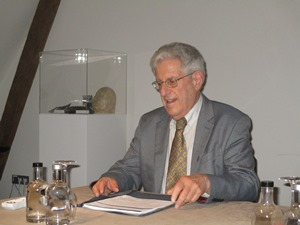
In the context of the UCSIA-IJS/University of Antwerp Chair of Jewish-Christian Relations, in collaboration with the Institute for Jewish Studies (IJS) of the University of Antwerp, UCSIA organized public lectures on 16 and 22 February 2017 as well as a guest lecture.
Prof. David Ruderman, professor of Modern Jewish History at the University of Pennsylvania, again headed up this chair. He dialogued with Prof. Theo Dunkelgrün, postdoctoral researcher at the Centre for Research in the Arts, Social Sciences and Humanities (Cambridge University) on the thinking of Jewish intellectuals Isaac Baer Levinsohn (1788–1860) and Moritz Steinschneider (1816–1907). Levinsohn was one of the founding fathers of the East European Jewish Enlightenment; through Steinschneider, the modern Jewish bibliography was able to develop. Both were experts in the Christian tradition and bridged the Jewish community with Christian communities and modern society.
The Lutheran message of Protestant missionary Alexander McCaul (1799–1863) enabled the Eastern European Jewish community to determine its position in the 19th century. Isaac Baar Levinsohn’s polemical answer teaches us a lot about rabbinic culture, but also shows a good understanding of intra-religious differences within Christianity. All in all, Levinsohn is critical and nuanced regarding both Judaism and Christianity in the light of modernization.
Theo Dunkelgrün highlighted the figure of Moritz Steinschneider who gathered scientific facts about Judaism in a number of encyclopedias. He collected writings about Jewish literature, including from the Arab tradition, which formed the basis of libraries in Leiden, Berlin and Oxford, where Judaism is being scientifically investigated. He believed that secular Western universities should devote themselves to the study of Judaism.
Watch the lecture
Christine Hayes (2015-2016)
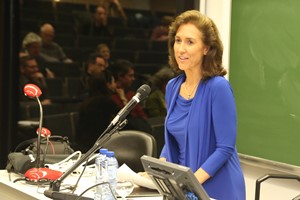
UCSIA organizes the UCSIA/IJS Chair Jewish Christian Relations in collaboration with the Institute of Jewish Studies of the University of Antwerp. In the academic year 2015-16, the chair was held by Christine Hayes.
Christine Hayes teaches classical Jewish religion and culture at Yale University (USA) and wrote What’s Divine about Divine Law? (Princeton University Press, 2015).
This edition included a guest lecture at IJS and two public lectures:
- Divine Law on 17 March 2016 in dialogue with Prof. dr. Paula Fredriksen (Boston University, Hebrew University of Jerusalem)
- Moses: God’s Partner or Adversary? on Monday 21 March 2016
According to Greek and Roman philosophers, the divine law is equal to the immutable order of nature. The positive law [ius positum], by contrast, is all about people and refers to specific and changing situations. The Torah recognizes the divinity of the law, but does not consider it universal or immutable, seeing the law as only revealed to one chosen community. Jewish scholars reconciled their divergent views with those of the Hellenistic majority in different ways. Philo of Alexandria, for example, explicitly identified the Torah with the Logos. The apostle Paul equated the Torah with positive law and placed the figure of Jesus as the incarnate Logos above both the Torah and positive law.
The guest professor exchanged views with Paula Fredriksen (Boston University, USA, Hebrew University, Jerusalem), who believes that the apostle Paul minimized the divine law to bring Christ’s message to the fore. This ‘anti-Jewish’ attitude helped the first Christians to overcome mutual differences. The universal Christian concept of God is derived from Hellenistic philosophy and surpasses both the Jewish particularism and the ethnic character of the gods of polytheism. Augustine put Christianity back in its Jewish context by pointing to the fact that the Mosaic law recognizes the physical; the conception of the incarnation of Christ built itself on this point.
Christine Hayes also analysed how some rabbis see Moses as an ally of God in the biblical story of the golden calf, while others recognize in Moses God’s challenging opponent. These various Talmudic traditions shed light on the relationship between God and man, the nature of God, and the human power to change the course of history.
Watch the lecture
Warren Zev Harvey (2014-2015)
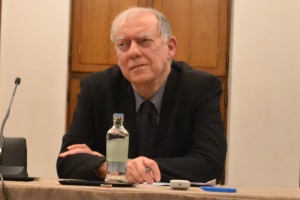
The seventh edition of the UCSIA Chair for Christian-Jewish relationships welcomed professor Zev Harvey of the department of Jewish Thought at the Hebrew University of Jerusalem. He was a guest speaker at the conference IJS and UCSIA organized last year in the frame of the Chair on ‘Is There a Judeo-Christian Tradition?’ (a publication of the proceedings is forthcoming).
This time he gave two public lectures (on February 12th and 19th 2015) at the University of Antwerp for an audience of about 50 attendees on the topic of negative theology, the second in dialogue with professor of Church History and History of Theology at Tilburg University, Paul van Geest.
Professor Zev Harvey also gave two guest colleges in the courses ‘Judaism and Philosophy’ (on the cosmopolitan character of Jewish philosophy) and ‘Introduction on Jewish Culture’ (on the Midrash), which were attended by over 50 students.
Israel Yuval (2013-2014)
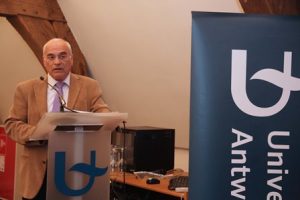
UCSIA organised the sixth edition of the UCSIA/IJS Chair for Jewish-Christian Relations on 12 and 13 February 2014 in cooperation with the Institute of Jewish Studies (University of Antwerp). The programme comprised two public lectures and a conference.
Israel Jacob Yuval (Hebrew University, Jeruzalem) analysed the mutual influence of Jews and Christians during Late Antiquity and the Early Middle Ages. He emphasized the influence of Christianity and the New Testament on the development of Rabbinic Judaism of Mishnah and Talmud. Ada Rapoport-Albert (University College London) pointed out the differences between the rich female Christian mysticism and the absence of a female principle in the Kabbalah. Yet, Jewish-gnostic sources can be traced in the Christian Maryan tradition.
The conference examined the concept of a ‘Jewish-Christian tradition’ from the angle of theology, literature, history and philosophy. The concept was already used in Europe during the 19th century and some consider it to be a Christian finding to objectify ‘the Jew’. Today, the concept is polemically used to distinguish the European heritage and identity from Islam. In the United States, the concept was only recently introduced by Protestant theologians, but is resisted by Jewish theologians who fear their tradition being reduced as part of Christianity.
Ideas of supersession and exclusiveness dominate the theological debate whereby a religion imposes itself on an already existing religion. The interactions between Judaism and Christianity cannot be reduced to simplistic patterns. ‘Critical theology’ by contrast looks upon the Jewish-Christian tradition from the angle of a shared common life and support of one another based on a relationship with God.
Contributors: Itzhak Benyamini (University of Haifa), Veerle Fraeters (University of Antwerp), Jacques Haers (KU Leuven), Elisabeth Harris (Liverpool Hope University), Warren Zeev Harvey (Hebrew University of Jerusalem), Vivian Liska (University of Antwerp), Michael Mach (Tel-Aviv University), Yitzhak Melamed (Johns Hopkins University), Emmanuel Nathan (KU Leuven), Ada Rapoport-Albert (University College London), Anya Topolski (KU Leuven), Bernd Witte (Heinrich-Heine University Dusseldorf), Israel Yuval (Hebrew University of Jerusalem)
David Ruderman (2012-2013)
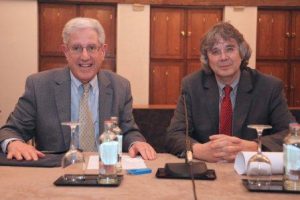
David B. Ruderman is the Joseph Meyerhoff Professor of Modern Jewish History and the Ella Darivoff Director of the Center for Advanced Judaic Studies at the University of Pennsylvania. Professor Ruderman was educated at the City College of New York, the Teacher’s Institute of the Jewish Theological Seminary of America, and Columbia University. He received his rabbinical degree from the Hebrew Union College-Jewish Institute of Religion in New York, and his PhD in Jewish history from the Hebrew University of Jerusalem. Professor Ruderman has taught in the Graduate School of the Jewish Theological Seminary of America in New York, the Hebrew University in Jerusalem, and was a fellow at the Institute for Advanced Study at the Hebrew University. In June 2001, the National Foundation for Jewish Culture honored him with its lifetime achievement award for his work in Jewish history.
During the academic year 2012-2013, the fifth edition of this initiative, Prof. dr. David B. Ruderman held the chair for the second time. He gave two evening lectures for a general audience:
On 21 February 2013, he discussed the different ways in which Christians and Jews dealt with the scientific revolution in Early Modernity with Prof. Dr. Steven Vanden Broecke (University of Ghent).
On 7 March, and jointly with Prof. Dr. Peter Stallybrass (University of Pennsylvania), he discussed the divergent interpretation of Jews and Christians of Genesis and its implications for their mutual relationship and their relationship with the text.
Furthermore, he lectured on medieval and early modern Jewish history at the Department of History of the University of Antwerp.
Theo Dunkelgrün (2011-2012)
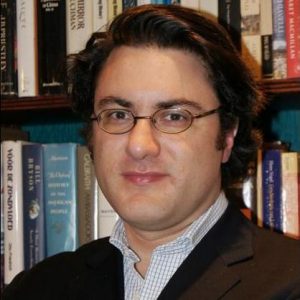
Theodor Dunkelgrün (Delft, 1976) studied at the universities of Tel Aviv, Leiden, Chicago and Princeton. His research focusses on the early modern history of ideas and bible studies, the history of the Hebrew book and the intellectual and scientifical interaction and cooperation between Jews, Christians and Muslims in the early modern world. He spent a year in Antwerp as scholarship student of the Belgian American Educational Foundation for the study of the Antwerp Polyglot Bible and described Hebrew manuscript in museum Plantin-Moretus. In academic year 2010-2011 he was Martin Gruss Fellow at the Herbert D. Katz Center for Advanced Judaic Studies, University of Pennsylvania. In the autumn of 2011 he was the de National Endowment for the Humanities Research Fellow at the Center for Medieval and Renaissance Studies, Saint Louis University. He recently published “The Hebrew Library of a Renaissance Humanist. Andreas Masius and the Bibliography to his Iosuae Imperatoris Historia (1574) with a Latin Edition and an Annotated English Translation” in Studia Rosenthaliana 43 (2011).
In the framework of his position of UCSIA/IJS Chair Jewish Christian Relations, he gave 2 public lectures:
- Plantijn’s Rabbi on Thursday 16 February 2012
- The Sources of Antwerp’s Polyglot Bible on Tuesday 6 March 2012 in collaboration with Piet Van Boxel.
Elisheva Carlebach (2010-2011)
Elisheva Carlebach held the Chair in 2011. She is Salo Baron Professor of Jewish History, Culture, and Society at the Department of History, Columbia University, New York.
In a lecture on 17 February, Elisheva Carlebach, Professor of Jewish History and Culture at Columbia University, gave an account of the inner struggle of Jews who converted to Christianity in the 17th century and of their ambivalent position between two cultures.
On 22 February, she showed how the new Gregorian calendar impacted on the way in which Jews experienced their culture and religion in a changed social context. Louis Caruana sj (Heythrop College, UK) philosophised on different concepts of time (chronology, eschatology …) as conceptualised by Aristotle, Saint Augustine, Martin Heidegger and Paul Ricoeur. Amongst other things, the experience of time constitutes the identity of a group. For example, the early Jewish community shared a linear experience of time. The human character of Jesus shifted the perspective to the present and the action of the individual: from chronos’ (time as duration) to ‘kairos’ (a decisive moment).
David Meyer (2009-2010)
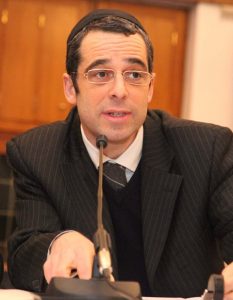
UCSIA and the Institute of Jewish Studies of the University of Antwerp (IJS) hold a shared interest in Jewish-Christian relations. On Thursday 11th February, Rabbi David MEYER and Canon Hendrik HOET held a debate on the elements in the Jewish and the Christian Holy Scripture that praise violence and reject the tradition of “the other”. Both speakers advocated an open dialogue and a renewed theology.
Rabbi David Meyer is licentiate in mathematics and was awarded a master’s degree in social sciences by EHESS in Paris, as well as a master’s degree in Hebrew and Jewish Studies by the University of London and Leo Baeck Rabbinical Seminary of London. David Meyer has already taken several initiatives for cooperation and dialogue to bring the three monotheistic religions closer together.
The theme of the lecture was inspired by the book Les Versets douloureux – Bible, Evangile et Coran entre conflit et dialogue which Rabbi Meyer wrote together with Yves Simoens sj and Soheib Bencheikh (Lessius, 2008). Canon Hoet participated in the exchange the Saint-Egidio Community organised with Jamal Maftouhi and Aharon Malinsky which led to the publication of Trialoog. Hoopvolle stemmen voor een angstige tijd (Lannoo, 2005). They discuss the ‘painful verses’ of their resprective scriptures, torah and bible. ‘Painful verses’ are these verses in which the other’s tradition is addressed in terms of violence, hate and rejection.
Rabbi David Meyer states that, when tracing Jewish-Christian history, we have to conclude that it has been inexistent. We do find a comprehensive body of medieval dispute, but even in the ‘Age of Enlightenment’ there are no traces of honest dialogue. Where the history of the ghetto ends, the story of assimilation and the striving for juridical recognition starts. Only years after the Shoah, the Catholic Church incites a new critical dialogue, with Vatican II and Nostra Aetate. Inspired by the Church the Jews timidly engage in dialogue after having for a long time questioned its relevance. What did they have to reproach themselves? This position was no longer tenable. The political reality of violence in Israel and lack of respect vis-à-vis the other called for self-reflection.
On a theological level true dialogue cannot be limited to a question of curiosity or tolerance. It implies doubting oneself through listening to the other and creating space for the truth of the other within oneself. If I persist in my complaisance, I will not be able to create this void to lodge the other. This does not imply an act of auto-flagellation.
David Meyer has immersed himself in the study of torah, bible and talmud, the former oriented to attaining perfection, the second aiming at canonisation, the latter comprising human interpretation. He arrived at the following questioning: why does the torah include a commandment to genocide (in the story of Amalek) and does the talmud try to replace the genealogical argument by behavioural arguments to justify the killing (the Amalek tribe is responsible for its proper sort because they called upon a genocide of the Jews in the first place)?
This led him to his theology of transgression. It is a way of coping with the painful verses. If we refuse the method of transgression we risk fanaticism. We also have to recognise the fluidity of the text (how marginal remarks get incorporated in the original text). To avoid extremist interpretations self-criticism is essential.
This way of reasoning naturally provokes contradiction, less from without, than from within the own community. Often heard reprisals vary from ‘you give arms to the enemy’ (we prefer to be quiet about these dubious verses) to ‘there is no comparison possible’ (the number of painful verses is limited in our tradition). To the former argument Rabbi Meyer replies that taking seriously our proper weaknesses allows for admitting someone else’s weaknesses, to the latter argument he responds that it is not a question of quantity. We have to admit that we are like the others.
The biblical verses which diabolise the Jews are in need of ‘detoxification’, Canon Hendrik Hoet replies, since they cannot be simply abrogated. A reinterpretation in the wider context of literature and history is required. The apostles Paul and Matthew show the way. We must not forget that the disciples of Jesus also disavowed him. We should accept that authors and texts are not perfect and avoid being ‘slave to the letter of the text’. More than a religion of the book Christianity is a religion of the spirit of Jesus. And to understand this spirit dialogue is a prerequisite. It is like an act of love, neither of which I am capable to grasp in its full potential.
David Meyer responds by indicating how this act of detoxification presupposes the acceptance of the true message of the painful verses and how they are also vectors of violence. These verses combine the beauty of the gesture with the horror of the act (cf. the sacrifice of Isaac). A rereading in the light of history and literature also entails a loss of the eternal, universal character. But in stead of being slave to the Creator we should consider ourselves partners in God.
David Ruderman (2008-2009)
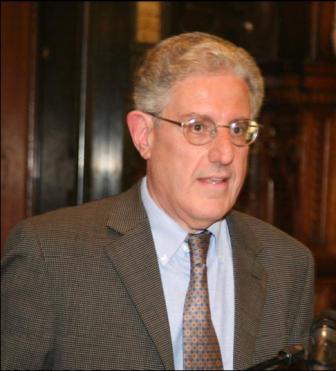
David B. Ruderman is the Joseph Meyerhoff Professor of Modern Jewish History and the Ella Darivoff director of the Center for Advanced Judaic Studies at the University of Pennsylvania. Professor Ruderman was educated at the City College of New York, the Teacher’s Institute of the Jewish Theological Seminary of America, and Columbia University. He received his rabbinical degree from the Hebrew Union College-Jewish Institute of Religion in New York, and his PhD in Jewish history from the Hebrew University of Jerusalem. Professor Ruderman has taught in the Graduate School of the Jewish Theological Seminary of America in New York, the Hebrew University in Jerusalem, and was a fellow at the Institute for Advanced Study at the Hebrew University. In June 2001, the National Foundation for Jewish Culture honored him with its lifetime achievement award for his work in Jewish history.
Selected Publications: Connecting the Covenants: Judaism and the Search for Christian Identity in Eighteenth-Century England (2007); Cultural Intermediaries: Jewish Intellectuals in Early Modern Italy (2004); Jewish Thought and Scientific Discovery in Early Modern Europe (2001); Jewish Enlightenment in an English Key: Anglo-Jewry’s Construction of Modern Jewish Thought (2000); Jewish Thought and Scientific Discovery in Early Modern Europe (1995).
Professor Ruderman gave two public lectures:
- Jewish and Christian Cultures in Early Modern Europe on Thursday 12 February 2009
- Two American Jewish Responses to Modernity: Mordechai Kaplan and Abraham Heschel on Thursday 5 March 2009
From early February until middle March 2009 he will give the course Modern Jewish Intellectual and Cultural History at the History Department of the University of Antwerp.
Events
Franz Rosenzweig and Martin Buber on Divine and Human Love
seminar UCSIA-IJS Chair
7 March 2024
Philosophies of Love between Judaism and Christianity
lecture UCSIA-IJS Chair
5 March 2024
The Politics of Jesus' Death
seminar UCSIA-IJS Chair
24 February 2023
The Strangeness of Jesus
lecture UCSIA-IJS Chair
20 February 2023
The Rabbi and the Jesuit
lecture UCSIA-IJS Chair
30 June 2022
*** cancelled ***
From Fracture to Flourishing: Jewish Law, Theology, and Environmental Ethics
webinar UCSIA-IJS Chair
1 March 2022
Au nom de la séparation: judaïsme et christianisme à l’épreuve
webinar UCSIA-IJS Chair
(in French)
18 February 2021
Levinas: Between Judaism, Christianity and Philosophy
panel debate UCSIA/IJS Chair
19 February 2020
Afterlives of Sacrifice
lecture UCSIA-IJS Chair
4 June 2020
CANCELLED
Converso Paulinism: Between ‘Marrano’ Apologetics to Judaeo-Christian Theology
lecture UCSIA/IJS Chair
26 February 2019
And the Rest is History: Sabbath versus Sunday
lecture UCSIA/IJS Chair
21 February 2019
Edith Stein and the Jewish-Christian Dialogue
lecture UCSIA/IJS Chair
5 December 2018
News
Converso-Paulinism
View Claude Stuczynski's talk on converso paulinism in the framework of the UCSIA-IJS chair.
In collaboration with
Institute of Jewish Studies
interdisciplinary research centre for the scientific study of Judaism
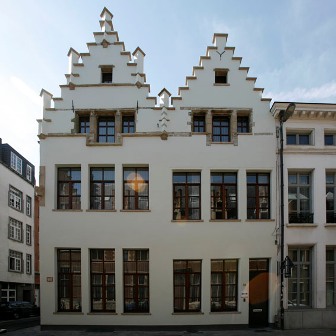
UCSIA
Koningstraat 2
B-2000 Antwerpen
info@ucsia.be
Tel. +32 (0)3 265 49 60
Voorlopige locatie tijdens de renovatiewerken:
Blindestraat 14, 2000 Antwerpen
